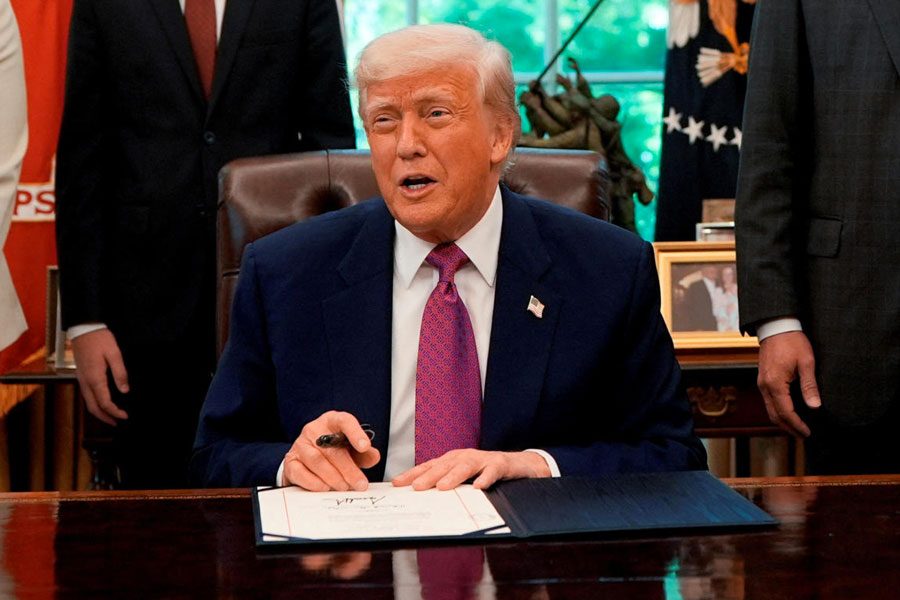A federal court on Wednesday blocked US President Donald Trump from imposing sweeping tariffs on imports under an emergency-powers law, swiftly throwing into doubt Trump's signature set of economic policies that have rattled global financial markets, frustrated trade partners and raised broader fears about inflation intensifying and the economy slumping.
The ruling from a three-judge panel at the New York-based US Court of International Trade came after several lawsuits arguing Trump has exceeded his authority and left the country's trade policy dependent on his whims.
Trump has repeatedly said the tariffs would force manufacturers to bring back factory jobs to the US and generate enough revenue to reduce federal budget deficits.
He used the tariffs as a negotiating cudgel in hopes of forcing other nations to negotiate agreements that favoured the US, suggesting he would simply set the rates himself if the terms were unsatisfactory.
White House spokesperson Kush Desai said that trade deficits amount to a national emergency “that has decimated American communities, left our workers behind, and weakened our defense industrial base — facts that the court did not dispute".
The administration, he said, remains “committed to using every lever of executive power to address this crisis and restore American greatness".
But for now, Trump might not have the threat of import taxes to exact his will on the world economy as he had intended, since doing so would require congressional approval.
What remains unclear is whether the White House will respond to the ruling by pausing all of its emergency power tariffs in the interim.
Trump might still be able to temporarily launch import taxes of 15 per cent for 150 days on nations with which the US runs a substantial trade deficit.
The ruling notes that a president has this authority under Section 122 of the Trade Act of 1974.
The ruling amounted to a categorical rejection of the legal underpinnings of some of Trump's signature and most controversial actions of his four-month-old second term.
The administration swiftly filed notice of appeal -- and the Supreme Court will almost certainly be called upon to lend a final answer -- but it casts a sharp blow.
The case was heard by three judges: Timothy Reif, who was appointed by Trump; Jane Restani, named to the bench by former president Ronald Reagan; and Gary Katzman, an appointee of former president Barack Obama.
“The worldwide and retaliatory tariff orders exceed any authority granted to the president by IEEPA to regulate importation by means of tariffs,” the court wrote, referring to the 1977 International Emergency Economic Powers Act.
It was filed in the US Court of International Trade, a federal court that deals specifically with civil lawsuits involving international trade law.
While tariffs must typically be approved by Congress, Trump has said he has the power to act to address the trade deficits he calls a national emergency.
He is facing at least seven lawsuits challenging the levies.
The plaintiffs argued that the emergency powers law does not authorise the use of tariffs, and even if it did, the trade deficit is not an emergency because the US has run a trade deficit with the rest of the world for 49 consecutive years.
Trump imposed tariffs on most countries of the world in an effort to reverse America's massive and long-standing trade deficits.
He earlier plastered levies on imports from Canada, China and Mexico to combat the illegal flow of immigrants and the synthetic opioids across the US border.
His administration argues that courts approved then-president Richard Nixon's emergency use of tariffs in 1971, and that only Congress, and not the courts, can determine the “political” question of whether the president's rationale for declaring an emergency complies with the law.
Trump's Liberation Day tariffs shook global financial markets and led many economists to downgrade the outlook for US economic growth.
So far, though, the tariffs appear to have had little impact on the world's largest economy.
The lawsuit was filed by a group of small businesses, including a wine importer, VOS Selections, whose owner has said the tariffs were having a major impact and his company may not survive.
A dozen states also filed suit, led by Oregon.
“This ruling reaffirms that our laws matter, and that trade decisions can't be made on the president's whim,” Attorney General Dan Rayfield said.
Oregon Senator Ron Wyden, a top Democrat on the Senate Finance Committee, said the tariffs had "jacked up prices on groceries and cars, threatened shortages of essential goods and wrecked supply chains for American businesses, large and small".










